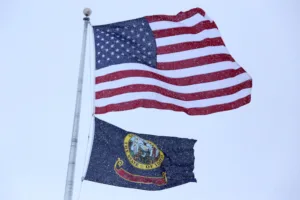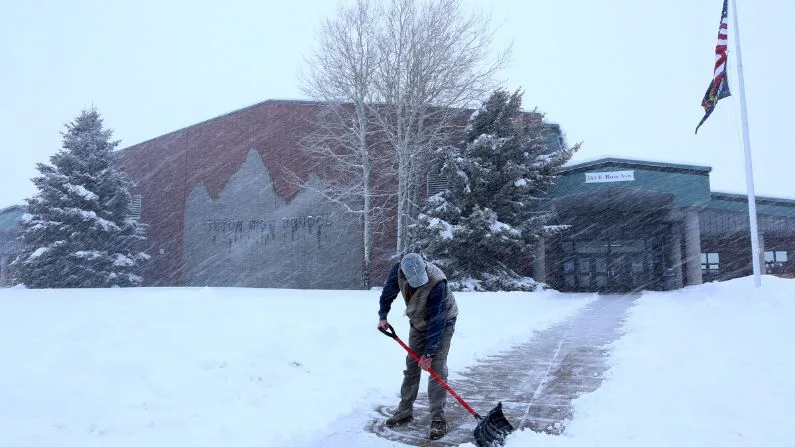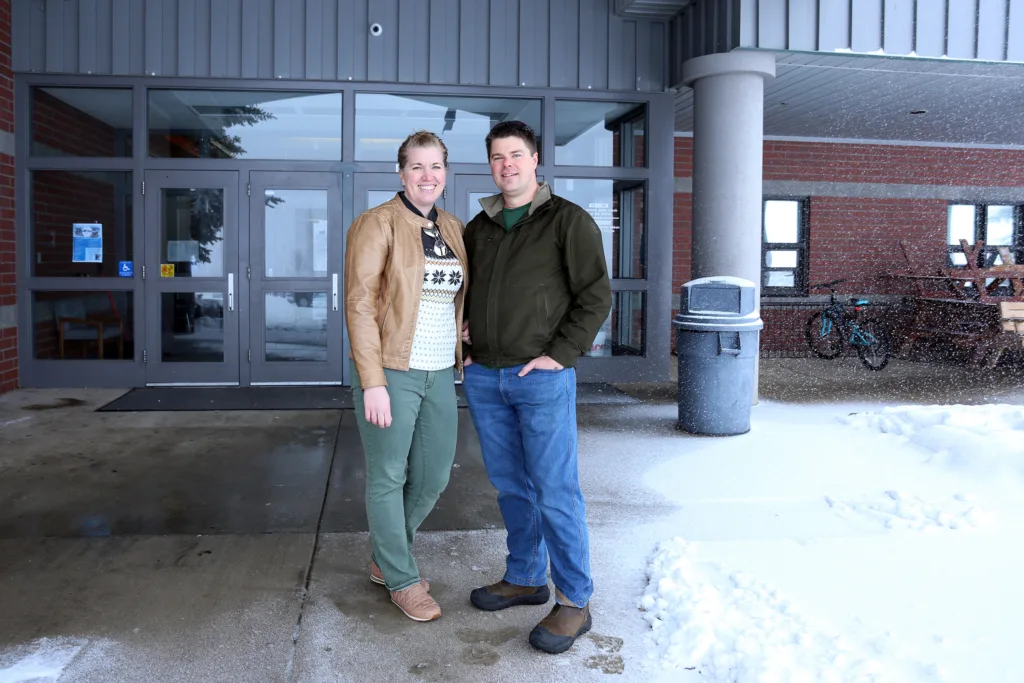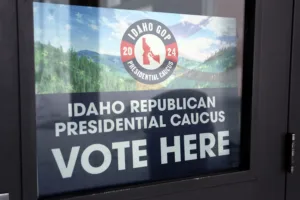Idaho switched to caucuses this year to help determine the 2024 presidential nominees after a legislative mistake removed the Gem State’s presidential primary date last year. Just 2% of Teton County’s eligible registered Republicans voted in the GOP contest.
Volunteers shoveled and sprinkled ice melt along the sidewalk leading into Teton High School in Driggs shortly before noon on Saturday, March 2, when doors opened for the Idaho Republican Presidential Caucus.
“You think for the Republican caucus, you’d have red,” one voter joked after seeing the bright blue color of the salt.
Snow that started on Friday continued to fall steadily throughout the two-hour voting period, and many voters like Trudi Kaufman, from near Tetonia, said the extreme weather made it hard to show up.
“Even though my husband plowed our driveway, it’s getting just filled as much as he plowed it, and the roads were rough,” she said.
Still, Kaufman made a point to attend — because she had a mission.
“I wanted to vote against Trump, basically, because he scares me,” Kaufman said. “I want to be maybe the lone Republican who didn’t vote for Trump in this county,” she added with a laugh.
It turns out that Kaufman, who supported former South Carolina Governor Nikki Haley — who has since dropped out of the race, following Super Tuesday — wasn’t the only person to vote against former President Donald Trump, but she was in the minority. Official results for Teton County from the Idaho GOP tallied 49 votes for Trump, 10 for Haley and two for Florida Governor Ron DeSantis, though he has also dropped out of the race.
The 61 people who voted represent just under 2% of the registered Republicans in Teton County who were eligible to vote, according to KHOL’s analysis of publicly available data from the Idaho Secretary of State’s office. 3,080 voters were registered as Republicans by Dec. 31, 2023, the Idaho Republican Party’s deadline to register to participate in the caucus. By contrast, 475 people voted in Teton County in the 2020 Republican presidential primary, according to the same office.
Requirements to be physically present
Teton County’s low turnout aligns with participation numbers across the rest of the state. Analysis by The Idaho Capital Sun found that about 93% of registered Republicans didn’t vote in the caucus.
“We regularly see lower turnout in caucuses for a few reasons,” said Jaclyn Kettler, a political scientist at Boise State University focused on state politics and elections.
The biggest reason, she said, is that people generally need to be physically present for a caucus at a specific place and time. There was no absentee voting option for this Republican caucus — not if you had to work or were too ill, or even if you were serving abroad in the military.
“Another challenge is the geography of Idaho,” Kettler added. “Some of these counties are geographically quite large [and] have physical features that make it difficult to travel.”
That said, the state Republican party was criticized for not allowing absentee voting in this nominating contest. But Chairwoman Dorothy Moon has said the state GOP did its best to re-enfranchise as many Republican voters as possible after the State Legislature “disenfranchised everyone by removing the presidential primary.”
“We’re in this odd situation where the presidential primary election date accidentally got removed last year during the legislative session,” Kettler explained.
That happened as part of an effort backed by Idaho Secretary of State Phil McGrane to streamline Idaho’s elections and move the presidential primary to coincide with other state and local primaries in May. There were two pieces of legislation making the change: One got rid of the old presidential primary date and the other confirmed the new one. But just the first bill got passed before the legislature adjourned.
“There were some efforts to try to address this issue, but they have not been successful so far,” Kettler said, “so the parties were left with the option of holding a caucus.”
The Idaho Democratic Party will hold its caucus on May 23 — and it will offer an absentee voting option. As for Republicans who participated last Saturday, several told KHOL it felt like a normal election, with a paper ballot.
“I was expecting something different because it’s a caucus but, you know, I can fill out a bubble. It’s fine.” – Driggs resident Jessica Curren
Harley Wilcox, a former Republican county commissioner from Victor, sported a beige beaver fun cowboy hat for the caucus, where he also volunteered.
“You make sure that you are on the register. You get a stamp. You go into the balloting location,” he said, explaining the voting process to KHOL. “They give you a ballot and then they stamp your hand with a different color to show that you voted.”
Asked which candidate he’s supporting this year, Wilcox said he’ll be voting for Trump again. “I think that he essentially is an idiot when he talks but I love his policy and I think he’s the best candidate, and I hope he wins,” he said. “I judge the man by his actions and not necessarily by his words. Sometimes he says the right thing but a lot of times he don’t.”
Concerns about election transparency
Ballots were supposed to be counted by hand after voting finished at 2 p.m. However, journalists weren’t allowed inside caucus sites to report and observe the count like they are during state-run elections. The Idaho Capital Sun first reported on the press restriction in mid-February, raising concerns about transparency that Kettler, the political scientist, said she agrees with.
“If people have concerns about election security or integrity, closing the doors may increase those concerns, even among their own voters,” she said.
The Idaho GOP was not able to accommodate an interview request for this story. But its rules chairman, Brent Regan, wrote in a newsletter before the caucus that Chairwoman Moon was simply following the rules set by the Republican State Central Committee, which stated that only registered Republicans and their minor children would be allowed into caucus sites. He also said balloting requires “a degree of secrecy” to protect voter privacy and to “prevent intimidation by bad actors, including members of the media.”

The United States and Idaho flags fly at Teton High School in Driggs during the winter storm. (Kyle Mackie/KHOL)
However, KHOL confirmed a loophole to the press restriction: In a phone call the day before the caucus, a party representative said that journalists who were also registered Republicans would be allowed to report — and observe vote counting — inside their own caucus sites, as long as they didn’t interfere or take pictures of voters. Asked by email whether that created an unfair advantage for reporters who happen to be Republicans, Regan said the rules allow them to enter the facility. He also insisted “nothing is being hidden or obscured.”
The Idaho Democratic Party did not respond by press time to an inquiry about whether or not they would allow reporters into their caucus sites in May.
Back outside the high school — the only caucus site for Teton County — Curren, the Driggs voter, headed out into the storm with her husband after casting their ballots. They both supported Haley in the election and told KHOL they’re not happy about how polarized the country’s become.
“It’s really hard to not feel like you have a voice and that you’re [not] being overpowered by an extreme minority on either side,” she said.
That’s part of why Curren said she liked that this year’s caucus gave her the opportunity to vote earlier and have a choice between candidates before everyone but the frontrunner dropped out. She also encouraged fellow citizens to stay passionate about voting even if they’re not very excited about this year’s likely rematch between President Biden and former President Trump.
“Not everybody in every country gets to vote, and it’s a privilege that we have and that we should absolutely honor and take advantage of.” -Driggs resident Jessica Curren
Looking ahead to the general election, Curren said she’s excited to teach her 18-year-old daughter about voting. It’s just that in Idaho, the rules about how to cast a ballot might have changed again by the next time a presidential primary rolls around.
Editor’s Note: The headline of this story has been changed to indicate this is not Idaho’s first GOP caucus. Additionally, an effort is now underway in the Idaho Legislature to reinstate the state’s presidential primary system.







